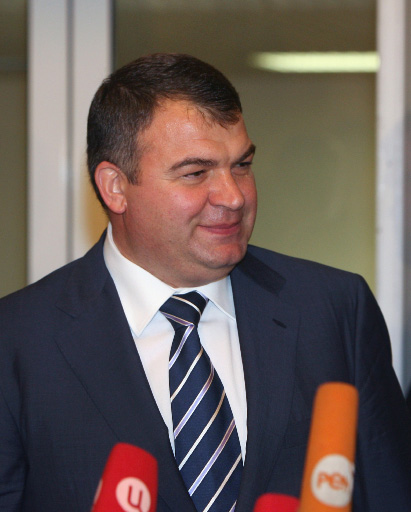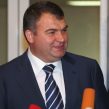
Russian Military Reform Delayed by Financial Crisis
Publication: Eurasia Daily Monitor Volume: 6 Issue: 17
By:

Russia’s agenda for military reform, announced by Defense Minister Anatoliy Serdyukov in October 2008, is facing revisions and delays due to the global financial crisis. This has also affected the arms industry, as there are fewer customers for the purchase of military hardware, and has consequently damaged Russia’s defense industry, which relies heavily on the international export market. Boris Obnosov, the general manager of the Tactical Missile Arms Corporation, for example, recently expressed his confidence that the defense industry would pull through the crisis but admitted that this would depend on state assistance in the form of inexpensive loans, tax breaks, and additional state orders. Without this, many Russian defense companies would go under.
Prime Minister Vladimir Putin is already actively deflecting blame away from the government by attacking the inefficiencies of the defense industry. He underscored the vital nature of Russia’s defense industry, which he linked to maintaining Russia’s security at a time when the country’s own military was in desperate need of modern equipment. Despite the declining demand abroad, Putin is confident that increased state spending will preserve the volume of production. He said that fiscal planning envisaged spending 1 trillion rubles ($30 billion) in 2009, rising to 4 trillion rubles ($121 billion) by 2011, for the purchase of military equipment for the Russian armed forces. “The majority of defense enterprises are companies [with local employees]; the well-being of millions of citizens depends on them. A fitting response from the state is therefore required,” Putin explained. The trouble for the Russian state, however, is that the number of defense industry companies on the list for state assistance during the crisis is continuing to escalate (Komsomolskaya Pravda, Moscow, January 16).
Putin attributes these problems, in the mainly state-owned enterprises, to mismanagement and the “inefficiency” of executives. Alluding to the longer term implications of the crisis, Putin acknowledged that the state could not bail out such companies indefinitely and called for checks to be made about whether banks were lending to the defense industry and were not artificially inflating interest rates on those loans. He said that the state would not cover these losses endlessly.
The sense of crisis within Russia’s defense industry is noticeably deepening, even over a short period of time, as reports increase about the number of companies struggling to cope with the current economic climate. In Bolshoy Kamen in Russia’s Far East, the Dalenergosbyt Far East energy company cut power to the Vostok plant, a subsidiary of the Amur shipyard, which repairs submarines for the Ministry of Defense (MoD). The radical action was taken as a result of the plant’s failure to pay its electricity bills since October 2008. A concession has now been agreed, allowing the debt to be repaid in installments, but the debt itself is continuing to mount. Dalenergosbyt has been imposing tougher measures on such companies since the start of 2009. “The money from these enterprises is needed for the stable and uninterrupted operation of [electricity] generation companies and power grid organizations supplying electricity to end consumers, especially in times of peak demand,” the company said (ITAR-TASS, Moscow, January 20).
Meanwhile, Putin has sought to shore up the defense industries, following a government meeting on January 15. He declared afterward:
We have agreed to provide subsidies from the federal budget to enterprises in the defense industry complex to compensate partly for interest paid on loans provided by Russian credit organizations. We have agreed to provide subsidies to compensate for some of the losses as a result of basic industrial operations, that is, subsidies preventing an unfavorable development of the economic situation and bankruptcies of enterprises (Interfax, January 15).
For the time being, this entails using the banking sector in support of the defense industries, but Putin has made it clear that the government might need to intervene if this fails.
Sources within the MoD have disclosed that its military reform and modernization program will be delayed as a result of this crisis. Initially it will postpone these plans by about six to eight months. Nonetheless, even in this deepening crisis, planned large-scale transformations, which include cutting 250,000 officers’ jobs and eliminating warrant officers, will go ahead within the announced timescale—the end of the year. This seems highly ambitious, given the announced revision of the 2009 federal budget. It seems only a question of time before more delays are announced to these plans.
It appears that the delays will mainly occur in implementing the transfer to a brigade-based manning principle. In Russia’s ground forces, the plan was to disband in a nine-month period, 23 all-arms divisions and 12 all-arms brigades, forming 39 permanent combat-ready all-arms brigades. In the Air Force it was planned to set up 55 aviation bases of different categories, based on the disbanded aviation divisions and regiments (Interfax, January 19). Transfer to the new brigade-based structure was scheduled for implementation by June 2009. Other aspects of the military reform agenda are hurriedly being revised, in light of the present financial crisis affecting the Russian state, as the planned cut in the overall numerical strength of Russia’s armed forces from 1.2 million down to 1 million scheduled for 2012, has now been postponed by presidential decree to 2016. The financial crisis has come at the worst possible time for Russian military reform.




